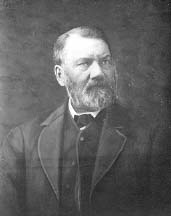Benjamin F. Potts facts for kids
Quick facts for kids
Benjamin Franklin Potts
|
|
|---|---|
 |
|
| Born | January 29, 1836 Fox Township, Carroll County, Ohio |
| Died | June 17, 1887 (aged 51) Helena, Montana |
| Place of burial |
Forestvale Cemetery, Helena, Montana
|
| Allegiance | United States Union |
| Service/ |
United States Army Union Army |
| Years of service | 1861–1866 |
| Rank | |
| Unit | Army of the Tennessee |
| Commands held | 32nd Ohio Infantry |
| Battles/wars | American Civil War |
| Other work | Governor of Montana Territory, Ohio State Senator |
| Signature | |
Benjamin Franklin Potts (born January 29, 1836 – died June 17, 1887) was an important American. He was a lawyer, a politician, and a brave soldier. During the American Civil War, he served as a general in the Union Army. After the war, he became the Governor of the Montana Territory from 1870 to 1883.
Potts led a group of infantry soldiers in the western part of the Civil War. He fought in some of the war's most important battles. People often praised him for his bravery and smart decisions in combat.
Early Life and Education
Benjamin Potts grew up on a farm in Fox Township, Carroll County, Ohio. His parents were James and Jane Potts. He went to local schools. When he was seventeen, he started working in a store in Wattsville.
In 1854, he went to Westminster College (Pennsylvania). But he ran out of money and had to return to Ohio. He then became a school teacher. In 1857, he began studying law with Ephraim R. Eckley. Eckley later became a U.S. Congressman. Potts was very interested in politics. He joined the Democratic Party.
In May 1859, he passed his law exam in Canton, Ohio. He then started a successful law business in Carrollton. In 1860, he went to the Democratic National Convention in Charleston, South Carolina. There, he supported Stephen A. Douglas for president.
Serving in the Civil War
When the Civil War began, Benjamin Potts joined the army. He was chosen as a captain in the 32nd Ohio Infantry regiment. He officially joined the army on August 29, 1861.
He fought with his regiment in western Virginia. He was at the Battle of Cheat Mountain and the Battle of Greenbrier River. In 1862, he fought in the Battle of McDowell. He also joined General John C. Frémont in chasing Stonewall Jackson. Potts was present at the Battle of Cross Keys and the Battle of Port Republic.
In July 1862, Potts was put in charge of an artillery battery (a group of cannons). This was in Winchester, Virginia. During the Maryland Campaign, he and his men went to Harpers Ferry. They were part of a huge surrender of U.S. Army soldiers. This was the largest surrender until World War II. Potts was then released and sent to Camp Douglas until he could be exchanged for a Confederate soldier.
In December 1862, Potts was promoted to lieutenant colonel. He took command of the 32nd Ohio regiment. It was in bad shape and had lost many soldiers. He worked hard to reorganize it and get more soldiers. On Christmas Day, he became a colonel.
Colonel Potts then led his regiment in many battles with the Army of the Tennessee. These included the Siege of Vicksburg and the Atlanta Campaign. At Port Gibson, his bravery was praised. At Raymond, Jackson, and Champion Hill, he was thanked by Major General John A. Logan. At Champion Hill, Colonel Potts and his regiment bravely charged. They captured eight Confederate cannons and half of an Alabama infantry group.
In August, Potts was put in charge of the 3rd Brigade. He went on an expedition to Monroe, Louisiana. In November, Major General James B. McPherson put Potts in command of the 2nd Brigade. During General William T. Sherman's expedition to Meridian, Potts led the way. He defeated the Rebels and drove them into Jackson. Later, Potts commanded the soldiers who destroyed the railroad from Meridian.
In 1864, Potts led the 1st Brigade. He was very important during the Atlanta Campaign, especially at the Battle of Atlanta. His division commander, Giles A. Smith, wrote that Colonel Potts did more than anyone else to save the good name of the Army of the Tennessee on July 22, 1864. That fall, he helped capture Savannah, Georgia.
In January 1865, Potts was promoted to brigadier general. He led his brigade during the Carolinas Campaign. He also marched in the Grand Review of the Armies in Washington, D.C. after the war ended. In May, he received the honorary rank of major general. This was a special honor given to many officers at the end of the Civil War.
Life After the War
Potts left the army in January 1866. He went back to Carroll County, Ohio. There, he continued his law and political work. He changed political parties and joined the Republicans.
In 1867, he was elected to the Ohio State Senate. Three years later, President Ulysses S. Grant (who was also a former general) asked him to be the governor of the Montana Territory. Potts first said no because his vote was needed in the Ohio Legislature. But he later accepted the job.
Potts served as governor until 1883. As governor, he worked a lot with Native American tribes. He also helped new towns like Missoula get official recognition. Potts brought political stability to Montana. This helped reduce vigilante activities and lawlessness in the territory. Later, he served in the territorial legislature.
Benjamin F. Potts passed away in 1887 in Helena, Montana. He was first buried in Benton Avenue Cemetery. Later, his remains were moved to Forestvale Cemetery.

